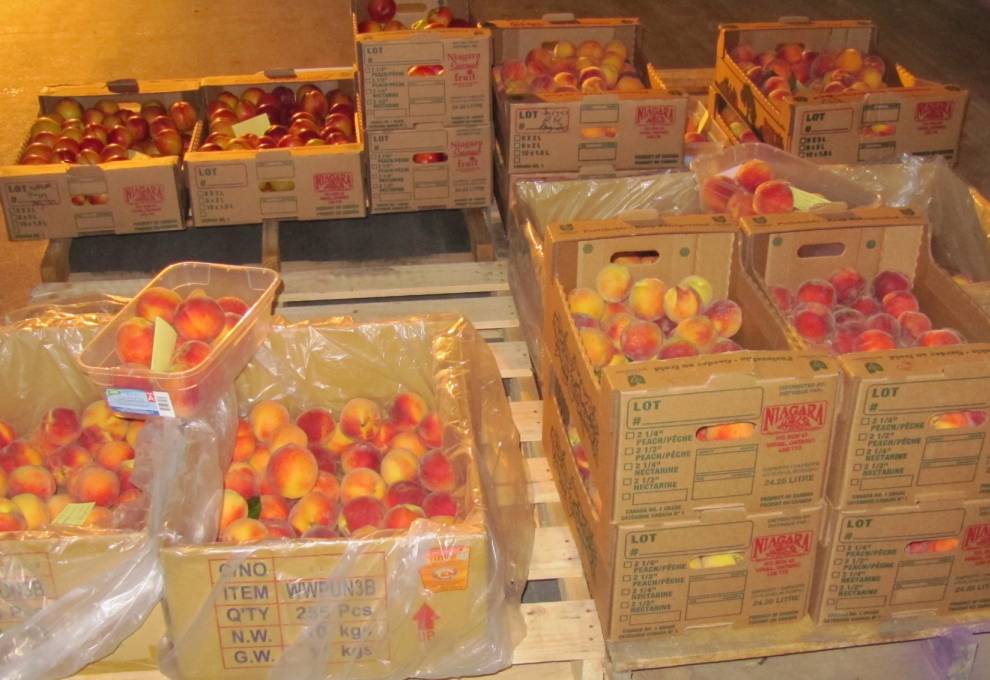
Chilling injury is a major limiting factor in the life of stored peaches. This can lead to several end-of-market quality concerns and result in plenty of consumer complaints. Loss of flavour generally precedes any visual symptoms of chilling injury, which are mealiness, lack of juiciness, flesh browning, flesh translucency, and/or failure to ripen. These fruit quality characteristics can quickly lead to unhappy consumers and lack of return purchases.
The greatest expression of chilling injury occurs after storage at temperatures ranging from 2 to 8°C, during subsequent ripening at room temperature. Therefore, the poor fruit quality issues associated with chilling injury are most often experienced by the end consumers, and not by growers or shippers. The range of temperatures between 2 and 8°C is known as the “killing temperature range” for peaches because of its severe adverse effect on fruit market life.
Chilling injury is genetically influenced and it’s triggered by a combination of storage temperature and duration. Symptom intensity and the onset of its development vary among cultivars, cultural practices, fruit maturity at harvest, postharvest handling, growing location and seasons. In collaboration with the Ontario Tender Fruit Growers, we began a four year project in 2014 to investigate the susceptibility of Ontario grown varieties to chilling – “Reducing Incidence of Chilling Injury/ Mealiness in Ontario’s Peaches and Nectarines.”
During the first year of study (2014) the following varieties were evaluated: Vivid, Redhaven, Harrow Beauty, and Glowingstar peaches, plus HW109 and Fantasia nectarines. During the second year of study (2015) the same varieties (except Harrow Beauty) were again evaluated, along with Allstar and Coral Star. Chilling injury developed in all varieties and the major symptoms were no flavour, lack of juiciness, and severe mealiness, but many fruit also exhibited flesh browning, bleeding, or translucency. Fruit from later harvests tended to be more susceptible to chilling injury, while HW109 nectarine appeared to be the least chilling sensitive.
Another three-year project was started in collaboration with the Ontario Tender Fruit Growers in 2015 – “Ontario Stone Fruit Harvest and Cold Chain Best Management Practices.” One objective was to investigate the effects of postharvest coatings on peach quality. During the first year of study (2015) Scholar 230 SC fungicide, Peach Nectarine & Plum Lustr 251 and 282, and DeccoNatur 550 were evaluated, as well as the effects of water spray and/or brushing. It was first determined that lab-scale trials were comparable to larger on-site trials at grower packinghouses.
In a separate preliminary experiment during this past season, the effect of temperature conditioning on peach mealiness was also investigated. Redhaven, Coral Star, and Glowingstar all showed substantial reduction in chilling injury when fruit were held for one or two days at 10°C prior to cold storage at 0°C for three weeks. Furthermore, fruit from this temperature conditioning regime appeared to maintain similar firmness as those placed quickly into cold storage at 0°C.
For more information on these projects and chilling injury in peaches, plan to attend the Ontario Fruit and Vegetable Convention in Niagara Falls. I will be presenting the results of these studies on Wednesday February 17 at 3 pm – Understanding Mealiness in Peaches. This will be followed with a presentation by my postharvest colleague Dr. Chris Walsh from the University of Maryland – Peach Storage and Mealiness. Dr. Walsh has more than 25 years of experience in this area of expertise.
Thanks to the Ontario Tender Fruit Growers, Matt Peters and N.M. Bartlett Inc. for their support, and Lorie Walker, Cathy Mous, Melissa Westaway, and Kathryn Carter (OMAFRA) for their technical assistance. These projects were funded in part through Growing Forward 2 (GF2), a federal-provincial-territorial initiative. The Agricultural Adaptation Council assists in the delivery of GF2 in Ontario.
Dr. Jennifer DeEll is fresh market quality program lead for horticultural crops, OMAFRA, Simcoe, Ontario.
KEYWORDS: Jennifer DeEll – AUTHORS -- mealiness in peaches – NEW TECHNOLOGY
CUTLINE 1: Peaches and nectarines in storage trials.
CUTLINE 2: Chilling injury and mealiness in ‘Glowingstar’ peach.
Add new comment